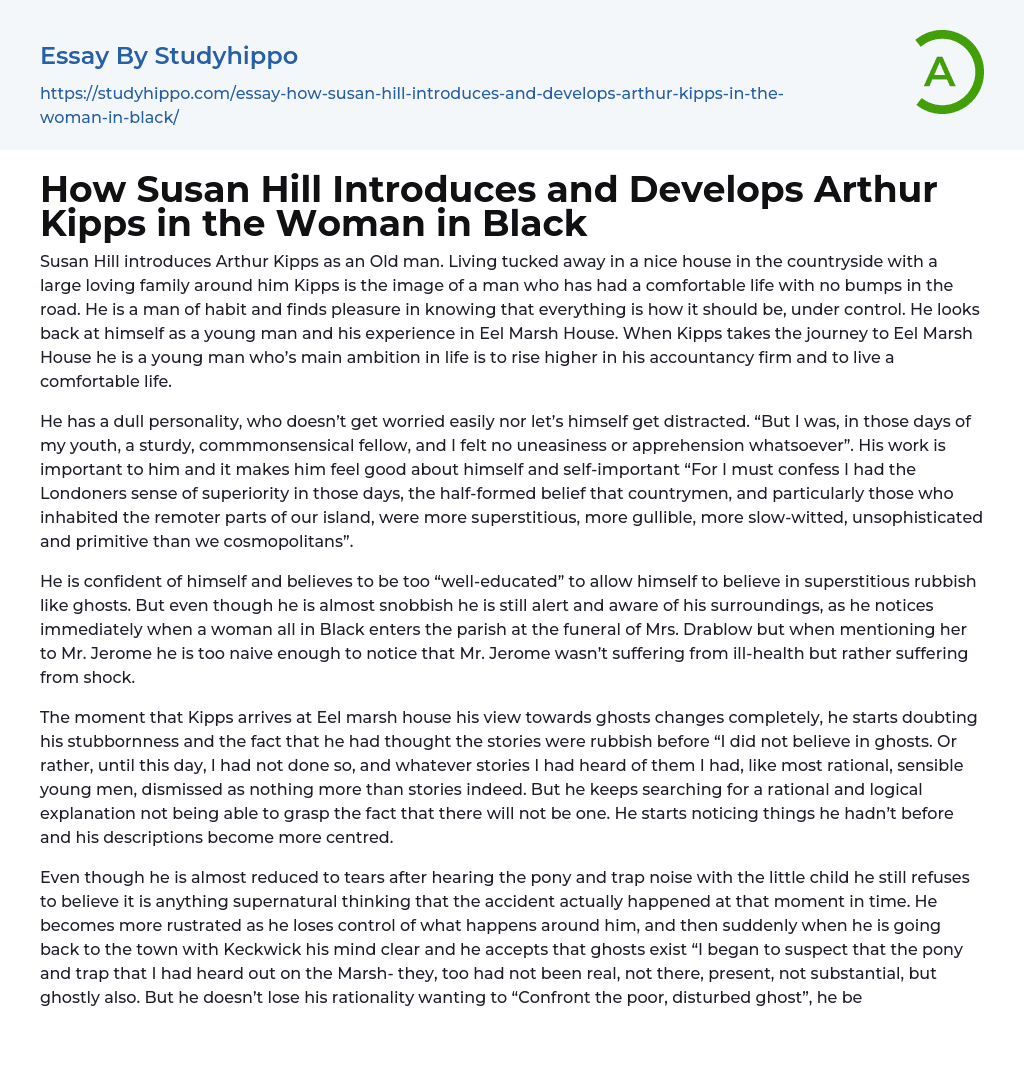

How Susan Hill Introduces and Develops Arthur Kipps in the Woman in Black Essay Example
Susan Hill introduces Arthur Kipps as an Old man. Living tucked away in a nice house in the countryside with a large loving family around him Kipps is the image of a man who has had a comfortable life with no bumps in the road. He is a man of habit and finds pleasure in knowing that everything is how it should be, under control. He looks back at himself as a young man and his experience in Eel Marsh House. When Kipps takes the journey to Eel Marsh House he is a young man who’s main ambition in life is to rise higher in his accountancy firm and to live a comfortable life.
He has a dull personality, who doesn’t get worried easily nor let’s himself get distracted. “But I was, in those days of my youth, a sturdy, commmonsensical fellow, and I fel
...t no uneasiness or apprehension whatsoever”. His work is important to him and it makes him feel good about himself and self-important “For I must confess I had the Londoners sense of superiority in those days, the half-formed belief that countrymen, and particularly those who inhabited the remoter parts of our island, were more superstitious, more gullible, more slow-witted, unsophisticated and primitive than we cosmopolitans”.
He is confident of himself and believes to be too “well-educated” to allow himself to believe in superstitious rubbish like ghosts. But even though he is almost snobbish he is still alert and aware of his surroundings, as he notices immediately when a woman all in Black enters the parish at the funeral of Mrs. Drablow but when mentioning her to Mr
Jerome he is too naive enough to notice that Mr. Jerome wasn’t suffering from ill-health but rather suffering from shock.
The moment that Kipps arrives at Eel marsh house his view towards ghosts changes completely, he starts doubting his stubbornness and the fact that he had thought the stories were rubbish before “I did not believe in ghosts. Or rather, until this day, I had not done so, and whatever stories I had heard of them I had, like most rational, sensible young men, dismissed as nothing more than stories indeed. But he keeps searching for a rational and logical explanation not being able to grasp the fact that there will not be one. He starts noticing things he hadn’t before and his descriptions become more centred.
Even though he is almost reduced to tears after hearing the pony and trap noise with the little child he still refuses to believe it is anything supernatural thinking that the accident actually happened at that moment in time. He becomes more rustrated as he loses control of what happens around him, and then suddenly when he is going back to the town with Keckwick his mind clear and he accepts that ghosts exist “I began to suspect that the pony and trap that I had heard out on the Marsh- they, too had not been real, not there, present, not substantial, but ghostly also. But he doesn’t lose his rationality wanting to “Confront the poor, disturbed ghost”, he becomes a spur-of the moment person rapidly changing his decisions from one moment to another, he is constantly overturning his plans as if he can’t decide what
to do.
At the end of the book even he realises how much the experience had changed his perspective even just watching a robin “I reflected that, before coming here, I would never have been able to concentrate on such an ordinary thing so completely but would have been restless to be up and off, doing this or that busily”. Even Mr. Daily says “You have come a long way since the night I met you on the late train” he makes it sound as he was a pupil who has grown into a young man, but he is troubled- As no-one know if the experience would have changes Kipps into the better or Worse.
- Book Summary essays
- Metaphor essays
- Reader essays
- Rhyme essays
- Literary devices essays
- Villain essays
- Books essays
- Genre essays
- Literary Criticism essays
- Writer essays
- Protagonist essays
- Simile essays
- Poem essays
- Book Report essays
- Book Review essays
- Greek Mythology essays
- Plot essays
- Tragic Hero essays
- Coming of Age essays
- Play essays
- Rhetoric essays
- Rhetorical Question essays
- Translation essays
- Understanding essays
- Reason essays
- Character essays
- Letter essays
- American Literature essays
- Literature Review essays
- Utopia essays
- Poetry Analysis essays
- Dante's Inferno essays
- Between The World and Me essays
- Incidents in The Life of a Slave Girl essays
- Flowers for Algernon essays
- Myth essays
- Everyday Use essays
- Boo Radley essays
- Genesis essays
- Richard iii essays
- Alice in Wonderland essays
- On the road essays
- Ozymandias essays
- The Nightingale essays
- Holden Caulfield essays
- Animal Farm essays
- 1984 essays
- A Hanging essays
- Shooting An Elephant essays
- A Tale Of Two Cities essays



